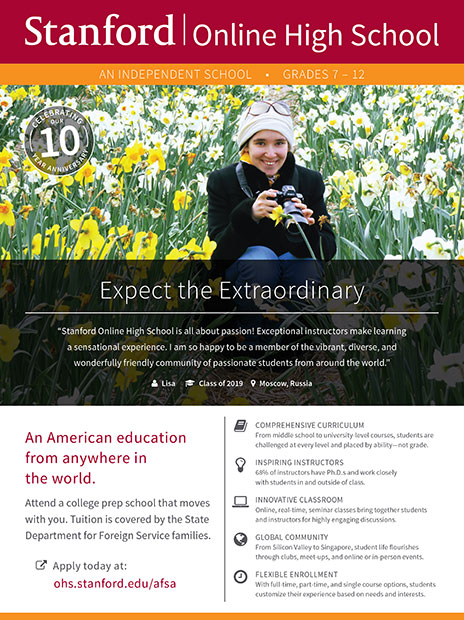Options for Educating Foreign Service Kids
For most Foreign Service families, the education of their children is a primary bidding concern. Here is an overview of the many options.
BY LEAH WALLACE
Not too long ago, I spoke with a new Foreign Service officer who had stopped by the Family Liaison Office to talk about all the changes he saw ahead for his family. While excited about his decision to join the Service, his feelings were accompanied by the litany of questions that frequently arise for new members of the Foreign Service: What have I gotten my family into? Where can my family live while I’m in training? What will our lives be like? How can we navigate this new lifestyle?
Foreign Service parents have the wonderful opportunity to offer their children the chance to learn about and explore cultures around the world. For example, children may pick up one or more languages while living in other countries. Indeed, many consider the possibility of their children becoming “global citizens” a major benefit of the Foreign Service lifestyle. The diverse experiences our children will have living and learning abroad will give them a leg up in the college application process, as many colleges consider students who have grown up globally a valuable asset to their student communities.
However, these perks are also accompanied by challenges. In fact, a primary bidding concern for most Foreign Service families is the education of their children. Fortunately, the State Department—believing that Foreign Service families should have educational opportunities as equal as possible to what they would have in the United States—offers an array of schooling options and allowances for families serving overseas.
This article will provide a brief overview of these options, as well as tips on how to manage the transition back to the United States and what to do if your post is evacuated.
The Scholastic Smorgasbord
International schools are a popular option for many Foreign Service families. These schools are independent institutions and have their own admissions policies. Often there are several to choose from. Most parents enroll their children in the international schools with an American curriculum because they believe this may positively impact their students’ transitions over time. Nevertheless, there are frequently British, French and local schools that some families find to be attractive options.
Parents should be aware that it is their responsibility to contact schools directly about their impending arrival at post. They must also complete the schools’ application processes. The community liaison office (CLO) may have information on the schools where post’s families currently send their children or have sent them in the past. CLO offices may be contacted by using the following email configuration: CLOpostname@state.gov (e.g., CLOLima@state.gov).
International schools are independent institutions and have their own admissions policies.
Homeschooling and virtual school programs have multiplied and flourished over the last two decades. Different program protocols exist. Many offer International Baccalaureate and Advanced Placement credits. Some have rolling start dates; others have more traditional beginning and completion dates. This can be an important option for Foreign Service families that find their transfer dates are “off-cycle” from more traditional semester timelines.
Some Foreign Service students attend boarding schools. These institutions offer wonderful opportunities, especially continuity during the high school years when kids may be more reluctant to relocate. There are many boarding schools in the United States, as well as overseas. Some U.S. boarding schools may be located close to relatives, which may be attractive to some Foreign Service families; but overseas boarding schools located closer to the family’s post can make home visits easier for the children.
Families considering boarding school may want to look at those accredited by U.S.-based educational associations, a factor that may be important when transferring to a new school or applying to college. Also, many offer I.B. and A.P. credits. Others have specialty programs in sports, arts, sciences, robotics and ecology, to name a few. There is even a boarding school in Vermont with a working farm, where the students are responsible for growing their own food and caring for the animals.
What about children with special needs? Unlike public school systems in the United States, independent schools overseas are not legally required to provide educational opportunities to all students. Historically, independent schools have not provided many accommodations for students with special needs.
Fortunately, the overseas landscape for special needs education has improved over the past 15 years. Advances in technology have made the successful delivery of speech and occupational therapy via the Internet a much more viable option. And many international, independent schools now provide support for students with mild learning disabilities.
Families should be aware, however, that even when a school offers this support there are often limitations, including spaces available in these programs. Also, international educators—like members of the Foreign Service—are mobile; and, therefore, special needs services offered at a school one year may not be available the next.
Foreign Service parents must do their pre-bidding homework to decide if their children’s special needs will be adequately supported by the programs and resources available at post. If a parent has a child with special needs or suspects a child may need learning support, they should contact the Department of State’s Child and Family Program at MEDCFP@state.gov.
Fortunately, the overseas landscape for special needs education has improved over the past 15 years.
About Education Allowances
CFP can inform families of the special needs services available at certain posts and give information on how to access the Special Needs Education Allowance. Also, the Office of Overseas Schools (www.state.gov/m/a/os) can supply information about special education services provided by their regional education officers.
Foreign Service families with children should be well versed in education allowances. State’s Office of Allowances has an excellent Frequently Asked Questions page on its website www.state.gov/m/dghr/flo/c21944.htm). Each post has different allowances, which include an “at-post” and “away-from-post” education allowance that are subject to change every year. The “at-post” allowance may be used at whatever local school parents deem to be best suited for their child. The “away from post” allowance may be used to send a child to a boarding school.
While the Department of State gives families the freedom to choose the school that they think is the best fit for their children, there are limitations on the allowances that will be paid for school expenses. For instance, there are certain qualifications (e.g., mileage between the post and the school) that may apply in the computations.
Also, no education allowance is available for U.S.-based schooling if one parent resides in the United States, even if the Foreign Service parent is posted abroad. It is the responsibility of families to be aware of these limitations when making school choices for their children.
Coming Home
Some Foreign Service parents argue that the move from an overseas school to one in the United States is the most difficult transition for their children to make. Although it is natural to expect that bringing children to their home country would be easy, parents are often surprised at the reality: many American passport-wielding Foreign Service children regularly encounter some difficulty integrating back into their own country’s school system.
Sometimes these difficulties may be social in nature. I personally know families whose children come back for high school or college extremely excited to be “home,” only to discover that they don’t easily fit in with the other kids who have grown up in the United States.
Foreign Service families with children should be well versed in education allowances.
Other difficulties may arise in sports, for example. Such was the case for one young student who had been on the starting soccer team at her overseas school, but on returning to the United States found she had missed the entire preseason and was, thus, ineligible to play soccer that year.
A child’s reaction sometimes depends on the length of time he or she has been overseas. At other times, it depends on how much integration the child has had while on home leave.
In addition, parents need to keep careful school records when they transfer their children to new schools. It is helpful to keep lists of textbooks and syllabi to enable new school officials to evaluate how to award credits and appropriately place students into their new classes.
As an example, math and U.S. history credits—often necessary graduation requirements for Foreign Service students—can be particularly difficult to transfer. Some institutions do not even offer U.S. history. Fortunately, there are numerous excellent online U.S. history programs that are available for students overseas.
As for math, some international schools follow an integrated math curriculum, which lumps together an array of math subjects within one year. In other words, a term of geometry and a term of algebra might be combined into Math 9, while at another school the entire year of 9th grade math may focus on geometry only. The asymmetry in curricula can be problematic when transferring between schools.
For families coming back to Washington, D.C., there are excellent school districts to consider. All of these districts have wonderful websites with information on their requirements, jurisdictions, curricula and points of contacts for new families. The major challenge faced by families returning to the D.C. area is that enrollment in most local school systems requires a physical presence and a current local address. Families might want to consider this obstacle when organizing their transfer dates. One parent and the children may leave post earlier than the Foreign Service employee to establish a residence in the D.C. area for purposes of enrollment in their local school system.
Evacuations
Finally, I offer here a quick word on evacuations and education. During my time working in the Family Liaison Office there were multiple evacuations that forced families to leave in the middle of the school year. In this Foreign Service life, it is not uncommon for families to relocate without knowledge of how long their evacuation will last.
Often, because evacuations last three or more months, parents are compelled to enroll their students in a local school at the family’s safe haven location. Enrolling in a local school can provide much-needed structure for children while on evacuation status. In my experience, all schools in the D.C. metropolitan area worked with our Foreign Service families to provide as much continuity as possible for the students.
The asymmetry in curricula can be problematic when transferring between schools.
Also, many overseas schools have virtual school curricula and programs set up to support their students if they are evacuated for any reason. Some families opt to use the virtual school program exclusively; while other families choose to use the virtual school program in conjunction with enrolling in a local school.
In any event, keeping in touch with the overseas school is important to ensure the most optimal outcome for evacuated students.
You’re Not Alone
All Foreign Service families should be aware of the extensive resources available to them when contemplating their education options at their onward assignments. The Family Liaison Office should be the first stop for all FS families seeking guidance and resources. In particular, the FLO education and youth team is happy to answer any questions parents have regarding options for their children’s education and can be reached at FLOAskEducation@state.gov.
In addition, the Foreign Service Youth Foundation is a D.C.-metropolitan-based group that provides many activities for returning Foreign Service families. They have meet-ups for teens and middle schoolers, publish newsletters for all ages and organize outings year-round for the entire family.
FSYF sponsors annual contests for Foreign Service children to display their artistic, writing, scholastic and community service projects. They also have an established community where Foreign Service children can meet other Foreign Service kids who understand their lifestyle. For more information, please email the foundation at FSYF@FSYF.org.




